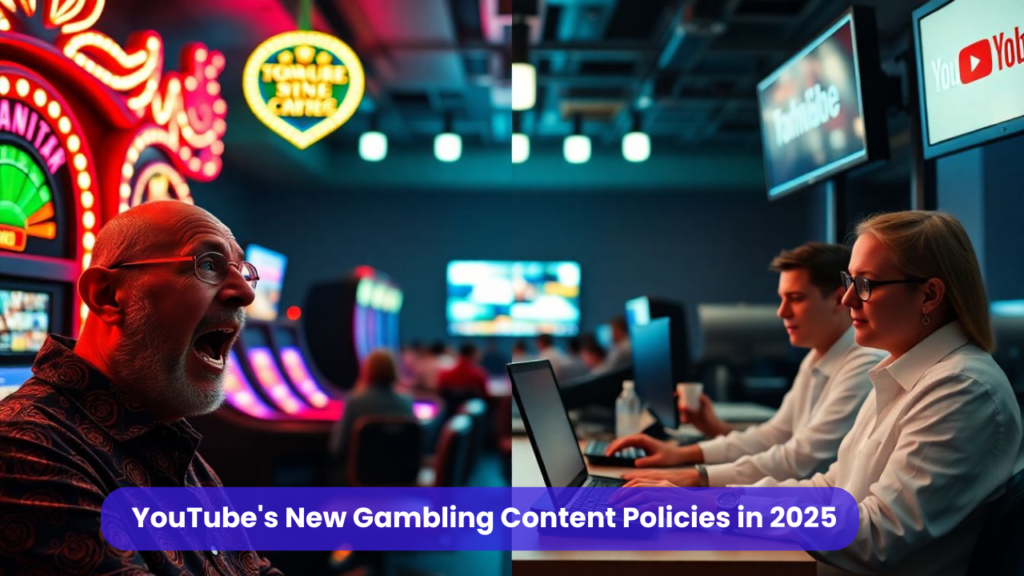
YouTube’s New Gambling Content Policies in 2025: What You Need to Know
Posted on March 16, 2025 by James Martin
YouTube is always refining its content policies to stay current with industry norms, audience expectations, and legal mandates. One category that’s recently undergone significant changes is gambling content. If you’re a YouTube creator creating content about gambling — be it casino games, sports betting, or poker — you should know about the new policies. In this post, we’ll break down the latest changes to YouTube’s gambling policies and how they could affect your channel.
Why YouTube Is Updating Its Gambling Policies
Let’s be real — gambling content is somewhat of a gray area on most sites. On the one hand, it’s incredibly popular, with millions of views on poker tournaments, betting tips, and casino game highlights. On the other hand, gambling has serious legal and ethical issues, particularly with regards to underage viewers and responsible gaming.
YouTube has been under mounting pressure from regulators and advertisers to ratchet up its gambling content policies. The aim is to balance creators’ freedom to post gambling content with the assurance that it’s done responsibly and within the confines of the law.
Important Updates in YouTube Gambling Policies
Following is a closer examination of the significant updates YouTube has made to gambling content in 2025:
1. Geographical Restrictions
YouTube will automatically block gambling content in those nations where gambling is prohibited or strictly regulated. If you upload a video with gambling or betting material, it can be invisible in some places. That is, even when your content meets local legislation, YouTube can still block it under platform-wide bans.
- What To Do:
Recheck the gambling legislation in your target nations.
Keep an eye on YouTube’s content analytics to determine whether any of your videos are being restricted by region.
2. Age Limitations on Betting Content
Every gambling-related content will now automatically be labeled as age-restricted. This will mean that your videos will require viewers to be signed into YouTube and above the legal age in order to be viewed.
- What You Should Do:
Ensure that your content adheres to YouTube’s age-restriction policies.
If you’re making educational gambling content, add responsible gaming disclaimers to your content to evade punishment.
3. No Embedding Direct Gambling Site Links
YouTube has enforced its policy of no external links to gambling websites even more firmly. Creators can no longer add direct links to online casinos, sportsbook sites, or any site that allows real-money gambling.
- What You Should Do:
Remove any direct gambling site links from video descriptions and pinned comments.
If you must state a gambling platform, give generic information and not direct links.
4. Sponsored Gambling Content Policies
If you’re collaborating with gambling sponsors, full disclosure is now mandated on YouTube. All content with or about gambling platforms needs to contain a clear sponsorship disclosure. Failure to disclose sponsorships may lead to demonetization or channel strikes.
- What To Do:
Explicitly declare whether your video is sponsored by a gambling firm.
Apply YouTube’s “Paid Promotion” tag to label the video as sponsored.
5. Responsible Gambling Promotion Is Encouraged
Creators are being urged by YouTube to promote responsible gambling. This is done by identifying the dangers involved in gambling, encouraging helplines, and informing viewers about how to gamble responsibly.
- What You Should Do:
Embed messages of responsible gambling in your content.
Insert warnings regarding the hazards of gambling and where viewers may find help in case of necessity.
How These Changes Affect Creators
If you’ve been relying on gambling-related content to grow your channel or generate revenue, these updates could present some challenges. On the bright side, YouTube’s new policies also offer opportunities for creators who can adapt and find creative ways to engage audiences within the new guidelines.
- Monetization Impact
Gambling content that complies with YouTube’s policies can still be monetized through ads and channel memberships.
Yet stricter rules might mean fewer brands ready to sponsor gambling content.
- Visibility and Reach
Local restrictions might restrict your reach, particularly if your viewership is from jurisdictions with strict regulations on gambling.
Age restrictions could lower the volume of views you receive from recreational viewers.
- Brand Partnerships
The more stringent rules on disclosing sponsorship might limit your ability to find deals with gambling brands.
But responsible gambling brands can still be good partners.
Tips for Producing Gambling Content That Is YouTube Policy-Compliant
- Prioritize Education and Entertainment
Rather than endorsing particular gambling sites, produce content that teaches audiences about the games, odds, and tactics. Educational content is less likely to be restricted and more likely to be advertiser-friendly.
- Steer Clear of Too Promotional Language
YouTube is cracking down on content that seems to promote irresponsible gambling behavior. Emphasize strategy, analysis, and fair play over mere win-hyping and large payouts.
- Diversify Your Content
Don’t let all your eggs be in the gambling basket. Diversifying with other content types — such as lifestyle, vlogs, and reaction videos — will keep your channel growing consistently even if gambling content is restricted.
- Engage with Your Audience Responsibly
Invite viewers to comment and express their opinions but refrain from responding to comments that encourage irresponsible gambling. AI platforms such as TubeBuddy and ManyChat can assist in comment moderation to ensure things remain manageable.
- The Future of Gambling Content on YouTube
YouTube’s new gambling policies are a reminder that content creation is constantly changing. Creators who are able to adapt and stick to the new rules without sacrificing creativity will have a significant advantage.
AI and automation technologies will be most important in assisting creators to remain ahead of these transformations. Technologies such as VidIQ, TubeBuddy, and Descript can assist you in optimizing content, comment management, and policy update tracking — and in doing so, remain compliant while scaling the channel simultaneously.
Conclusion
YouTube’s new gambling content policies might seem tight at first glance, but they are part of the platform’s wider initiative toward responsible content creation. By getting familiar with the new regulations and planning your content in line with them, you can keep on expanding your channel without getting into trouble.
Adjusting to these changes won’t only keep you away from penalties — it’ll also make your content more attractive to viewers and advertisers alike. Stay aware, stay innovative, and you’ll survive this new YouTube world.
Categories: Uncategorized

